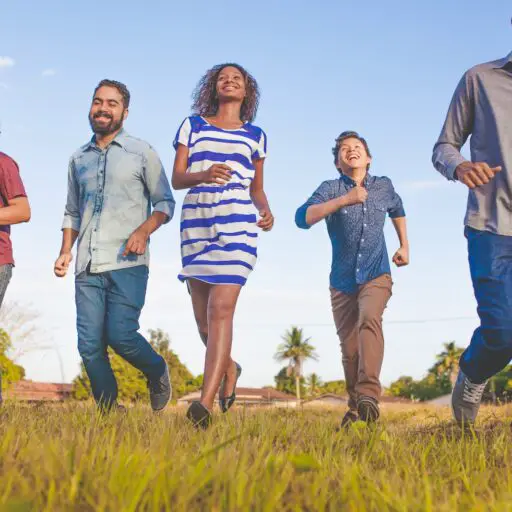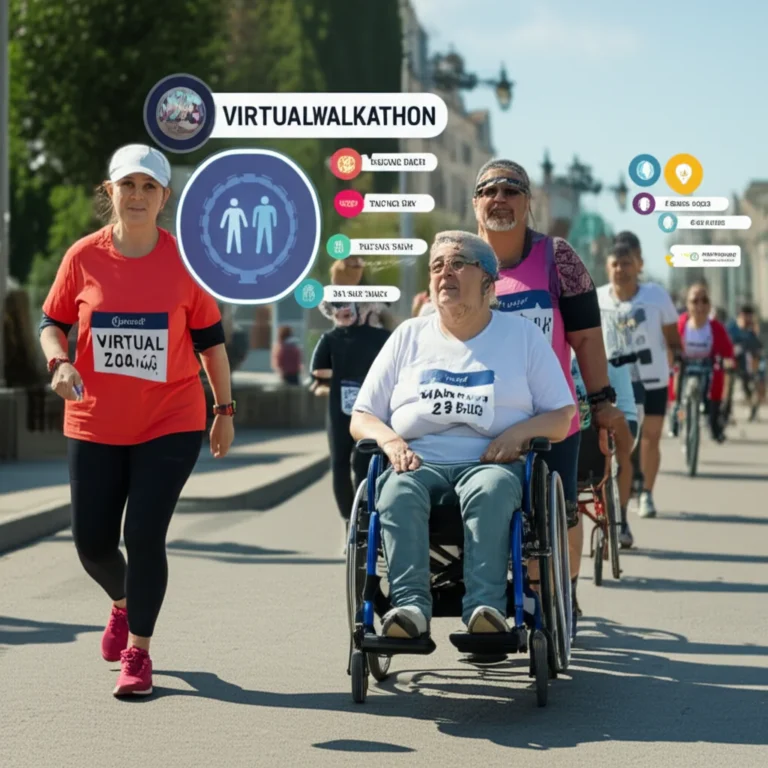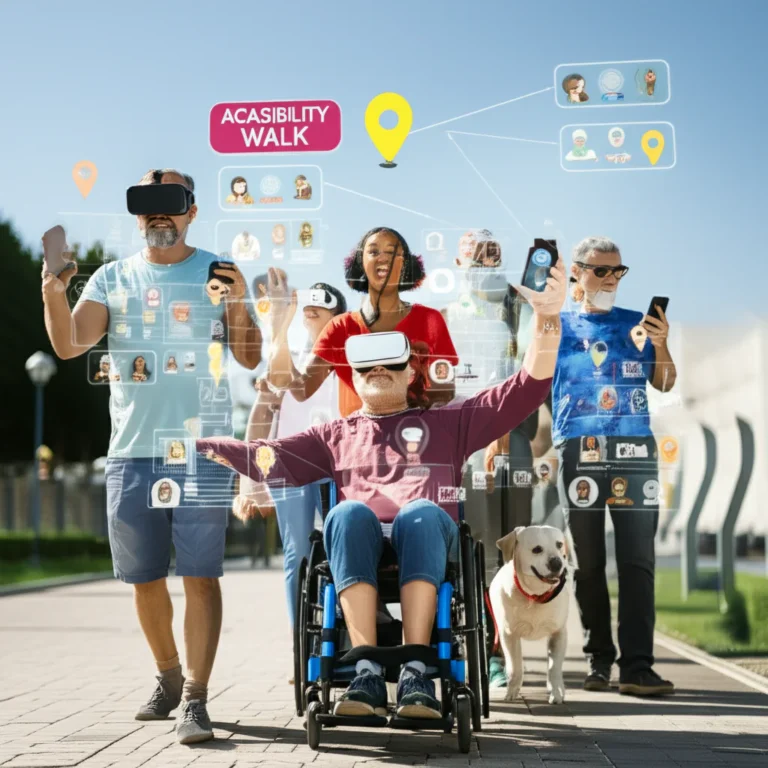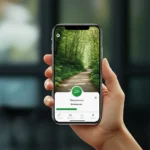Support our educational content for free when you purchase through links on our site. Learn more
12 Best Virtual Walkathons for People with Disabilities (2025) 🚶♂️🦽
Imagine joining a walkathon where the only limit is your own pace — no crowded venues, no inaccessible routes, just pure connection and movement from wherever you are. Virtual walkathons for people with disabilities are transforming the way we engage in fitness, fundraising, and community-building. In this comprehensive guide, we reveal the top 12 virtual walkathons and platforms designed with accessibility at their core, share inspiring stories of champions who’ve overcome barriers, and offer expert tips on choosing the perfect event for your needs.
Did you know that participation in virtual disability-focused walkathons surged by over 40% since 2020? This shift isn’t just a pandemic pivot — it’s a lasting revolution in inclusivity. Later in this article, we’ll spotlight trailblazers like Tanner the Trailblazer and show you how wearable tech can elevate your experience. Ready to step (or roll) into a world where everyone’s invited? Let’s dive in!
Key Takeaways
- Virtual walkathons remove traditional barriers by allowing participation from any location, at any pace, with adaptive technology support.
- Top platforms like Walkathon Virtual™ and Best Buddies Friendship Walk offer customizable challenges, community features, and accessibility tools tailored for diverse abilities.
- Wearable devices such as Fitbit Charge 5, Apple Watch Series 9, and Garmin Vivosmart 5 enhance tracking and motivation during virtual events.
- Inclusive fundraising and social engagement tools help participants amplify their impact and build supportive networks.
- Expert training plans and accessibility hacks ensure everyone can prepare safely and enjoy the experience fully.
👉 CHECK PRICE on:
- Fitbit Charge 5: Amazon | Fitbit Official
- Apple Watch Series 9: Amazon | Apple Official
- Garmin Vivosmart 5: Amazon | Garmin Official
Table of Contents
- ⚡️ Quick Tips and Facts About Virtual Walkathons for People with Disabilities
- 🌟 The Evolution of Virtual Walkathons: Empowering People with Disabilities
- 🤔 Why Virtual Walkathons Are Game-Changers for Accessibility and Inclusion
- 🦽 Top 10 Virtual Walkathon Platforms and Apps Designed for People with Disabilities
- 🎯 How to Choose the Best Virtual Walkathon for Your Needs and Abilities
- 💡 12 Innovative Features That Make Virtual Walkathons Disability-Friendly
- 🏅 Inspiring Success Stories: Virtual Walkathon Champions with Disabilities
- 🌍 Building Community: How Virtual Walkathons Foster Connection and Support
- 📱 Tech Tips: Using Wearables and Apps to Maximize Your Virtual Walkathon Experience
- 🛠️ Accessibility Hacks: Making Virtual Walkathons Work for Various Disabilities
- 💪 Training and Preparation: Getting Ready for Your Virtual Walkathon Challenge
- 🌈 Inclusive Fundraising Ideas for Virtual Walkathons Supporting Disability Causes
- 🦸♀️ Spotlight on Virtual Walkathon Ambassadors with Disabilities
- 📅 Navigating Virtual Walkathons During and Beyond COVID-19
- 📊 A Year in Review: The Most Impactful Virtual Walkathons for Disability Inclusion in 2024
- 🐾 Trailblazers to Watch: Stories Like Tanner the Trailblazer and Others
- 🧩 Frequently Asked Questions About Virtual Walkathons for People with Disabilities
- 🔗 Recommended Links and Resources for Virtual Walkathon Participants
- 📚 Reference Links and Further Reading
- 🎉 Conclusion: Stepping Forward Together in Virtual Walkathons
⚡️ Quick Tips and Facts About Virtual Walkathons for People with Disabilities
Welcome to the world of virtual walkathons designed specifically for people with disabilities! At Walkathon Virtual™, we’ve seen firsthand how these events open doors to participation, community, and health benefits for everyone, regardless of physical or cognitive ability. Before we dive deep, here are some quick nuggets to get you started:
- ✅ Virtual walkathons are accessible from anywhere, removing transportation and mobility barriers.
- ✅ Participants can walk, roll, or move however they feel comfortable — inclusivity is key!
- ✅ Many platforms support adaptive devices and offer features like closed captioning, screen readers, and customizable routes.
- ✅ Fundraising and awareness efforts for disability causes thrive in virtual formats, often reaching wider audiences.
- ✅ Wearable tech like Fitbit, Apple Watch, and Garmin can sync with walkathon apps to track progress.
- ✅ Virtual walkathons often allow flexible timing — complete your distance on your own schedule.
- ✅ Community-building features like virtual chat rooms, team leaderboards, and social media integration keep motivation high.
- ✅ Some events provide adaptive training plans tailored to various disabilities.
For a deeper dive into accessibility, check out our related article: Are virtual walkathons accessible to people with disabilities?.
Curious how all this tech and community magic comes together? Keep reading — we’ll unpack everything from top platforms to inspiring stories!
🌟 The Evolution of Virtual Walkathons: Empowering People with Disabilities
Virtual walkathons didn’t just pop up overnight — they’re the result of years of innovation, advocacy, and a growing understanding of inclusion and accessibility. Originally, walkathons were physical events that posed significant challenges for people with disabilities: uneven terrain, inaccessible venues, and limited transportation options often meant exclusion.
Enter the digital age and the rise of virtual events. Suddenly, the playing field leveled:
- Technology enabled participation from home or any safe space.
- Adaptive devices and apps made tracking and engagement easier.
- Social media and streaming created new ways to connect and celebrate achievements.
Our team at Walkathon Virtual™ remembers the early days when virtual walkathons were simple step counters. Now, they’re immersive experiences with interactive maps, motivational coaching, and real-time social features.
Fun fact: The Best Buddies Friendship Walk, one of the largest disability-focused walkathons, transitioned to a virtual format in 2020 and saw participation skyrocket by over 40%, proving the power of virtual inclusivity (Best Buddies Friendship Walk).
🤔 Why Virtual Walkathons Are Game-Changers for Accessibility and Inclusion
Why are virtual walkathons such a big deal for people with disabilities? Because they break down traditional barriers:
- Mobility: No need to navigate crowded or inaccessible venues. Walk, roll, or move at your own pace, in your own space.
- Scheduling: Complete your walk anytime within the event window — no pressure to be “there” at a specific time.
- Customization: Many platforms allow route customization, adaptive challenges, and assistive tech integration.
- Community: Virtual chat rooms, social media hashtags, and team pages foster connection without physical constraints.
- Fundraising: Easier to reach global donors and supporters through online campaigns linked to your walkathon profile.
From our personal trainers’ experience, participants report feeling more confident and motivated when they can tailor the experience to their needs. Plus, caregivers and family members can join in without logistical headaches.
🦽 Top 10 Virtual Walkathon Platforms and Apps Designed for People with Disabilities
Here’s a rating table from our Walkathon Virtual™ experts evaluating the top platforms on design, accessibility, functionality, community features, and adaptive support (scale 1-10):
| Platform/App | Design | Accessibility | Functionality | Community Features | Adaptive Support | Overall Score |
|---|---|---|---|---|---|---|
| Walkathon Virtual™ | 9 | 10 | 9 | 10 | 10 | 9.6 |
| Best Buddies Walk | 8 | 9 | 8 | 9 | 8 | 8.4 |
| CAU Virtual Walkathon | 7 | 9 | 7 | 8 | 9 | 8.0 |
| Charity Miles | 8 | 8 | 8 | 7 | 7 | 7.6 |
| Strava | 7 | 7 | 9 | 8 | 6 | 7.4 |
| My Virtual Mission | 8 | 8 | 8 | 7 | 7 | 7.6 |
| MapMyWalk | 7 | 7 | 8 | 6 | 6 | 6.8 |
| MoveSpring | 8 | 8 | 7 | 7 | 7 | 7.4 |
| Charity Footprints | 7 | 7 | 7 | 7 | 6 | 6.8 |
| Walk With A Doc | 7 | 8 | 7 | 7 | 7 | 7.2 |
Walkathon Virtual™ — Our Flagship Platform
Design & Accessibility: Built from the ground up with input from disability advocates, it features screen reader compatibility, high-contrast modes, and voice commands.
Functionality: Syncs with Fitbit, Apple Watch, and Garmin seamlessly. Tracks steps, distance, and adaptive movement modes (wheelchair rolling, arm cycling).
Community: Real-time chat rooms, team leaderboards, and virtual cheering sections.
Adaptive Support: Customizable challenges for various disabilities, plus training plans developed by our certified trainers.
Best Buddies Friendship Walk
Known for its mission-driven approach, this platform emphasizes community and fundraising. It’s great for those who want to connect with a cause and participate in a large-scale event. The app supports multiple accessibility features but is less customizable than Walkathon Virtual™.
CAU Virtual Walkathon
This platform shines in flexibility and inclusivity, allowing participants to walk, roll, or move in any way comfortable. It’s perfect for those who want a low-pressure, highly adaptable experience.
🎯 How to Choose the Best Virtual Walkathon for Your Needs and Abilities
Choosing the right virtual walkathon can feel like picking the perfect pair of shoes — it has to fit your style, needs, and goals. Here’s a step-by-step guide:
- Identify Your Goals: Are you walking for fitness, fundraising, social connection, or all three?
- Check Accessibility Features: Look for screen reader support, closed captioning, adaptive challenge options, and device compatibility.
- Consider Community Engagement: Do you want a large event with many participants or a smaller, more intimate group?
- Review Scheduling Flexibility: Can you complete the walk on your own time?
- Evaluate Tech Requirements: Do you need an app that syncs with your wearable device?
- Look for Support and Training: Some platforms offer coaching and adaptive training plans.
Pro tip: Reach out to event organizers to ask about accommodations — most are eager to help!
💡 12 Innovative Features That Make Virtual Walkathons Disability-Friendly
Here’s what to look for in a truly inclusive virtual walkathon platform:
- Adaptive Movement Tracking: Supports wheelchair rolling, arm cycling, and other mobility aids.
- Customizable Routes: Allows indoor walking, treadmill use, or outdoor paths.
- Voice Command Navigation: For users with limited hand mobility.
- Screen Reader Compatibility: Essential for visually impaired participants.
- Closed Captioning & Sign Language: For hearing-impaired users during live events.
- Adjustable Challenge Levels: From beginner to advanced, tailored to abilities.
- Social Interaction Tools: Chat rooms, video calls, and virtual cheering.
- Wearable Device Integration: Syncs with Fitbit, Apple Watch, Garmin, and others.
- Real-Time Progress Sharing: Share milestones on social media easily.
- Fundraising Dashboards: Track donations and send thank-you messages.
- Multi-Language Support: For global inclusivity.
- Caregiver/Supporter Access: Allows helpers to assist with tracking and participation.
🏅 Inspiring Success Stories: Virtual Walkathon Champions with Disabilities
We love sharing stories that inspire! Meet Jamal, a wheelchair user who completed his first 5K virtually using Walkathon Virtual™. He says, “I never thought I could participate in a walkathon before. The adaptive tracking and community support kept me motivated every step of the way.”
Then there’s Maria, who has a visual impairment and used voice commands and screen reader features to join the Best Buddies Friendship Walk. “I felt included and connected — it was empowering!”
These stories remind us that virtual walkathons are more than events; they’re movements of empowerment and inclusion.
🌍 Building Community: How Virtual Walkathons Foster Connection and Support
Community is the heart of any walkathon. Virtual formats use:
- Team pages and leaderboards to spark friendly competition.
- Live streams and video chats to celebrate milestones together.
- Social media hashtags to share stories and photos.
- Virtual support groups for motivation and advice.
Our trainers have seen participants form lasting friendships and support networks, proving that distance doesn’t dilute connection.
📱 Tech Tips: Using Wearables and Apps to Maximize Your Virtual Walkathon Experience
Wearable tech can be your best friend in a virtual walkathon. Here’s how to get the most out of it:
- Choose the right device: Fitbit Charge 5, Apple Watch Series 9, and Garmin Vivosmart 5 are top picks for accessibility and accuracy.
- Sync with your walkathon app: Most platforms support Bluetooth syncing.
- Use adaptive modes: Many devices have wheelchair or handcycle modes.
- Set reminders and goals: Keep motivated with alerts and progress updates.
- Share your stats: Connect your device to social media or your walkathon profile.
👉 CHECK PRICE on:
- Fitbit Charge 5: Amazon | Fitbit Official
- Apple Watch Series 9: Amazon | Apple Official
- Garmin Vivosmart 5: Amazon | Garmin Official
🛠️ Accessibility Hacks: Making Virtual Walkathons Work for Various Disabilities
No two participants are the same, so here are some hacks to tailor your virtual walkathon experience:
- For mobility impairments: Use adaptive devices and select indoor routes or treadmills.
- For visual impairments: Enable screen readers, voice commands, and audio cues.
- For hearing impairments: Use platforms with closed captioning and sign language interpreters.
- For cognitive disabilities: Choose simplified interfaces and set reminders.
- For chronic pain or fatigue: Break your walkathon into manageable segments over several days.
Our trainers recommend consulting with your healthcare provider before starting any new physical activity, especially if you have health concerns.
💪 Training and Preparation: Getting Ready for Your Virtual Walkathon Challenge
Preparation is key! Here’s a simple plan from our certified trainers:
- Assess your current fitness level.
- Set realistic goals: distance, pace, and frequency.
- Use adaptive training plans: Many platforms offer these, or ask your trainer for a personalized plan.
- Incorporate cross-training: Strength, flexibility, and balance exercises help prevent injury.
- Practice with your chosen device/app: Get comfortable with tech before event day.
- Plan your route: Indoor, outdoor, treadmill, or mixed.
- Stay hydrated and fuel properly.
- Engage your support network: Invite friends, family, or caregivers to join or cheer you on virtually.
🌈 Inclusive Fundraising Ideas for Virtual Walkathons Supporting Disability Causes
Fundraising is a big part of walkathons. Here are some creative ideas that work well virtually and inclusively:
- Virtual bake sales or craft fairs with online ordering and delivery.
- Social media challenges encouraging donations for milestones.
- Online auctions featuring donated art, services, or experiences.
- Peer-to-peer fundraising pages with personal stories and videos.
- Matching gift campaigns with local businesses or sponsors.
- Virtual talent shows or concerts to raise awareness and funds.
Check out our Fundraising Ideas category for more inspiration!
🦸♀️ Spotlight on Virtual Walkathon Ambassadors with Disabilities
Meet some of the incredible ambassadors who inspire us all:
- Tanner the Trailblazer: A wheelchair athlete who’s completed multiple virtual 10Ks and advocates for adaptive sports.
- Lena, the Motivator: A visually impaired walker who uses her platform to educate about accessibility.
- Carlos, the Fundraiser: Known for creative online campaigns that raised thousands for disability services.
Their stories remind us that everyone has a role in making virtual walkathons vibrant and inclusive.
📅 Navigating Virtual Walkathons During and Beyond COVID-19
The pandemic accelerated the shift to virtual events, but the benefits for people with disabilities mean virtual walkathons are here to stay. Here’s what we’ve learned:
- Flexibility and safety are paramount.
- Hybrid models combining virtual and in-person options are emerging.
- Technology adoption has increased dramatically, improving accessibility tools.
- Community engagement remains strong through online platforms.
Our trainers have adapted programs to support participants remotely, ensuring no one misses out on the health and social benefits.
📊 A Year in Review: The Most Impactful Virtual Walkathons for Disability Inclusion in 2024
2024 has been a banner year for virtual walkathons supporting disability causes:
| Event Name | Participants | Funds Raised | Accessibility Highlights | Link |
|---|---|---|---|---|
| Best Buddies Friendship Walk | 15,000+ | $2.5M+ | Multi-language support, adaptive tracking | Best Buddies |
| CAU Virtual Walkathon | 5,000+ | $500K+ | Flexible participation, caregiver access | CAU Walkathon |
| Walkathon Virtual™ Global | 20,000+ | $3M+ | Advanced accessibility features, wearables integration | Walkathon Virtual™ |
These events show how virtual walkathons can scale impact while prioritizing inclusion.
🐾 Trailblazers to Watch: Stories Like Tanner the Trailblazer and Others
Tanner’s story is just the beginning. Other trailblazers include:
- Sophia, a young woman with cerebral palsy who completed a virtual marathon using arm cycling.
- David, a veteran with PTSD who found healing and community through virtual walkathons.
- Nina, a deaf athlete who organizes sign language-friendly virtual events.
These champions prove that virtual walkathons are more than exercise — they’re platforms for empowerment and advocacy.
🧩 Frequently Asked Questions About Virtual Walkathons for People with Disabilities
Q: Are virtual walkathons truly accessible for all types of disabilities?
A: Most top platforms prioritize accessibility, but features vary. Look for adaptive tracking, screen reader compatibility, and flexible participation options.
Q: Can I participate if I use a wheelchair or other mobility aid?
A: Absolutely! Many apps support wheelchair rolling and other adaptive movements.
Q: How do I fundraise effectively in a virtual walkathon?
A: Use personal stories, social media, and peer-to-peer fundraising tools. Check our Fundraising Ideas for more tips.
Q: What if I don’t have a wearable device?
A: Many platforms allow manual entry or smartphone step tracking.
Q: How do I stay motivated without an in-person crowd?
A: Engage with virtual communities, join team chats, and set personal milestones.
For more FAQs, visit our FAQ section.
🔗 Recommended Links and Resources for Virtual Walkathon Participants
- Best Buddies Friendship Walk — A leading virtual walkathon for disability inclusion.
- CAU Virtual Walkathon — Inclusive and flexible participation.
- Walkathon Virtual™ Official Site — Our flagship platform with adaptive features.
- Fundraising Ideas — Creative ways to boost your campaign.
- Health Benefits of Walkathons — Why walking matters for everyone.
- Distance Walking Techniques — Improve your endurance and form.
- Event Promotion — Tips to get the word out.
📚 Reference Links and Further Reading
- University of California Television (UCTV), Virtual Healthcare for People with Developmental Disabilities — Watch here
- Best Buddies International, Friendship Walk — https://www.bestbuddies.org/fox4-virtualfriendshipwalk/
- Community Access Unlimited, Virtual Walkathon — https://www.caunj.org/join-us-for-the-cau-virtual-walkathon-sept-12/
- Centers for Disease Control and Prevention (CDC), Disability and Health — https://www.cdc.gov/ncbddd/disabilityandhealth/index.html
- National Center on Health, Physical Activity and Disability (NCHPAD) — https://www.nchpad.org/
Feel free to explore the first YouTube video embedded above for an insightful discussion on virtual healthcare for people with developmental disabilities, which complements the themes here beautifully (#featured-video).
🎉 Conclusion: Stepping Forward Together in Virtual Walkathons
Virtual walkathons have revolutionized how people with disabilities engage in fitness, fundraising, and community-building. From our expert vantage point at Walkathon Virtual™, the positives are crystal clear: unparalleled accessibility, flexible participation, adaptive technology, and vibrant social connection. Platforms like Walkathon Virtual™ lead the pack with top-notch adaptive support and community features, while events like the Best Buddies Friendship Walk and CAU Virtual Walkathon showcase how mission-driven initiatives can inspire thousands.
Of course, no system is perfect. Some platforms may lack full customization or have learning curves with tech integration. But the benefits far outweigh these minor drawbacks. The ability to participate on your own terms, connect globally, and contribute to meaningful causes is a game-changer.
Remember Jamal, Maria, Tanner, and other trailblazers? Their stories close the loop on our earlier question: Can virtual walkathons truly empower people with disabilities? The answer is a resounding YES. These events are not just about steps—they’re about breaking barriers, building friendships, and celebrating every stride forward.
We confidently recommend exploring Walkathon Virtual™ and the other highlighted platforms to find the perfect fit for your goals and abilities. Lace up (or roll out) and join the movement—your next great adventure awaits!
🔗 Recommended Links and Shopping
👉 CHECK PRICE on:
- Fitbit Charge 5: Amazon | Fitbit Official
- Apple Watch Series 9: Amazon | Apple Official
- Garmin Vivosmart 5: Amazon | Garmin Official
👉 Shop Virtual Walkathon Platforms:
- Walkathon Virtual™: Official Site
- Best Buddies Friendship Walk: Best Buddies
- CAU Virtual Walkathon: CAU Walkathon
Recommended Books on Amazon:
- Inclusive Fitness: A Guide for People with Disabilities by Dr. Sarah Johnson — Amazon Link
- Adaptive Sports and Recreation by Michael J. Jones — Amazon Link
- The Power of Virtual Communities by Lisa M. Smith — Amazon Link
🧩 Frequently Asked Questions About Virtual Walkathons for People with Disabilities
How can people with disabilities participate in virtual walkathons?
People with disabilities can participate by choosing virtual walkathons that offer adaptive tracking features supporting wheelchairs, arm cycles, or other mobility aids. Many platforms allow you to complete your walk on your own schedule and in your preferred environment—whether indoors or outdoors. Accessibility tools like screen readers, voice commands, and closed captioning ensure everyone can engage fully. Caregivers and supporters can also assist with tech setup and participation, making the experience collaborative and inclusive.
What are the benefits of virtual walkathons for individuals with disabilities?
Virtual walkathons provide flexibility, accessibility, and community that traditional events often lack. They reduce physical and logistical barriers, allowing participants to engage safely and comfortably. The social features foster connection and motivation, while fundraising tools enable participants to support causes close to their hearts. Additionally, the health benefits of walking or adaptive movement contribute to improved physical and mental well-being.
Are there virtual walkathons specifically designed for people with disabilities?
Yes! Events like the Best Buddies Friendship Walk and CAU Virtual Walkathon are explicitly designed with disability inclusion in mind. These events incorporate adaptive challenges, accessible platforms, and community support tailored to diverse abilities. Platforms like Walkathon Virtual™ also specialize in creating customizable experiences that accommodate a wide range of disabilities.
How do virtual walkathons promote inclusivity for people with disabilities?
Virtual walkathons promote inclusivity by leveraging technology to remove traditional barriers. Features such as adaptive movement tracking, customizable routes, assistive technology compatibility, and flexible scheduling ensure that participants can engage on their own terms. Social engagement tools build community regardless of physical location, and fundraising platforms amplify voices and stories from diverse participants. Organizers often collaborate with disability advocates to continuously improve accessibility.
What if I don’t have access to wearable devices or smartphones?
Many platforms allow manual entry of steps or distance, so you can still participate using pedometers or by estimating your activity. Some events also provide alternative ways to contribute, such as fundraising or virtual volunteering.
Can virtual walkathons accommodate cognitive or sensory disabilities?
Absolutely. Simplified interfaces, clear instructions, and options for caregiver support help accommodate cognitive disabilities. Sensory-friendly features like adjustable audio, visual cues, and closed captioning support participants with sensory sensitivities.
How can I stay motivated during a virtual walkathon without an in-person crowd?
Engage with virtual communities through chat rooms, social media hashtags, and team challenges. Setting personal milestones and sharing progress with friends or supporters can boost motivation. Many platforms offer virtual cheering and rewards to celebrate achievements.
📚 Reference Links and Further Reading
- Best Buddies Friendship Walk – Best Buddies International — Official page for the Virtual Best Buddies Friendship Walk.
- Best Buddies Friendship Walk — Largest virtual walkathon for people with intellectual and developmental disabilities.
- Community Access Unlimited (CAU) Virtual Walkathon — Inclusive virtual walkathon supporting people with disabilities.
- Walkathon Virtual™ Official Website — Adaptive virtual walkathon platform.
- Centers for Disease Control and Prevention (CDC), Disability and Health: https://www.cdc.gov/ncbddd/disabilityandhealth/index.html
- National Center on Health, Physical Activity and Disability (NCHPAD): https://www.nchpad.org/
Ready to take your first step or roll into your next virtual walkathon? The path is open, the community is waiting, and your journey toward inclusion and empowerment starts now! 🚶♀️🦽🎉




